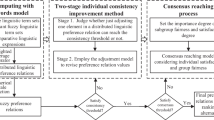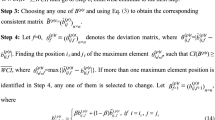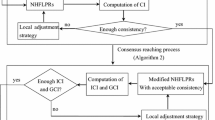Abstract
This paper presents a method for consensus measures and adjusting inconsistency of linguistic preference relations in group decision-making (GDM). Several consensus measures are defined by comparing positions of alternatives between individual ordered vectors and a collective ordered vector. In such a way, the consensus situation is evaluated in each moment in a more realistic way. Feedback mechanism would be applied if the consensus degree of all experts does not reach the required consensus level. This feedback mechanism is simple and easy computing process to help experts change their opinions in order to obtain the consensus level. It is based on the use of individual linguistic preferences, collective and individual ordered vectors of alternatives. It is also based on the use of fuzzy majority of consensus, represented by means of a linguistic quantifier.
Preview
Unable to display preview. Download preview PDF.
Similar content being viewed by others
References
Saaty, T.A.: The analytic hierarchy process. McGraw-Hill, New York (1980)
Orlorski, S.A.: Decision-making with a fuzzy preference relation. Fuzzy Sets and Systems 3, 155–167 (1978)
Herrera-Viedma, E., Herrera, F., Chiclana, F.: A Consensus Model for multiperson decision making with different preference structures. IEEE Transactions on Systems, Man and Cybernetics 3, 394–402 (2002)
Yager, R.R.: On ordered weighted averaging aggregation operators in multicriteria decision making. IEEE Transactions on Systems, Man and Cybernetics 18, 183–190 (1988)
Herrera, F., Herrera-Viedma, E., Verdegay, J.L.: Direct approach processes in group decision making using linguistic OWA operators. Fuzzy Sets and Systems 79, 175–190 (1996)
Herrera, F., Herrera-Viedma, E., Verdegay, J.L.: A sequential selection process in group decision making with linguistic assessment. Information Science 4, 223–239 (1995)
Herrera, F., Herrera-Viedma, E., Verdegay, J.L.: A Model of Consensus in group decision making under linguistic assessments. Fuzzy Sets and Systems 1, 73–87 (1996)
Herrera, F., Herrera-Viedma, E., Verdegay, J.L.: Linguistic Measures based on fuzzy coincidence for reaching consensus in group decision making. Journal of Approximate Reasoning 3, 309–334 (1997)
Fan, Z.P., Xiao, S.H.: Consistency and Ranking method for comparison matrix with linguistic assessment. Systems Engineering-Theory & Practice 5, 87–91 (2002)
Author information
Authors and Affiliations
Editor information
Editors and Affiliations
Rights and permissions
Copyright information
© 2005 Springer-Verlag Berlin Heidelberg
About this paper
Cite this paper
Fan, ZP., Chen, X. (2005). Consensus Measures and Adjusting Inconsistency of Linguistic Preference Relations in Group Decision Making. In: Wang, L., Jin, Y. (eds) Fuzzy Systems and Knowledge Discovery. FSKD 2005. Lecture Notes in Computer Science(), vol 3613. Springer, Berlin, Heidelberg. https://doi.org/10.1007/11539506_16
Download citation
DOI: https://doi.org/10.1007/11539506_16
Publisher Name: Springer, Berlin, Heidelberg
Print ISBN: 978-3-540-28312-6
Online ISBN: 978-3-540-31830-9
eBook Packages: Computer ScienceComputer Science (R0)




